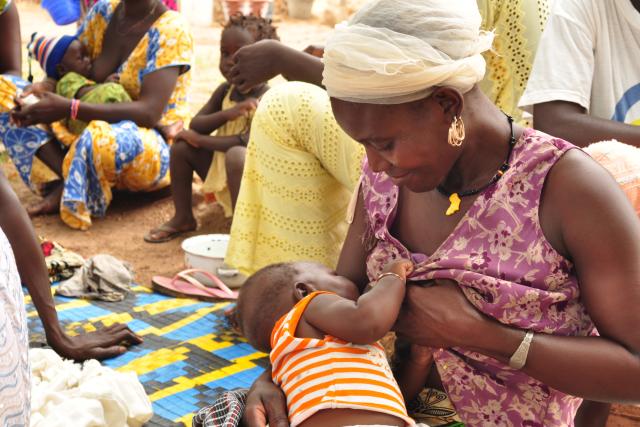World Breastfeeding Week

USAID and partners, with assistance from The TOPS Program, hosted a World Breastfeeding Week 2017 Webinar Series! Click here to see the full flyer with a list of the webinars.
July 31 - Barriers to Breastfeeding: Findings from a Systematic Review of Practices in 20 Countries
Despite numerous global initiatives on breastfeeding, trend data show that exclusive breastfeeding (EBF) rates have stagnated over the last two decades. The purpose of this systematic review was to determine barriers to exclusive breastfeeding in 25 low- and middle-income countries (LMICs) and discuss implications for programs. A search of SCOPUS, MEDLINE, CINAHL, and PsychINFO was conducted to retrieve studies from January 2000 to October 2015. Using inclusion criteria, we selected both qualitative and quantitative studies that described barriers to EBF in low- and middle-income countries. Following the application of systematic review criteria, 48 articles from 14 countries were included in the review. Sixteen barriers to EBF were identified in this review and will be presented. Improving the counseling skills of health workers to address breastfeeding problems and increasing community support for breastfeeding are critical components of infant and young child feeding programming, which will aid in attaining the 2025 World Health Assembly EBF targets. Legislation and regulations on marketing of breastmilk substitutes paid maternity leave, and breastfeeding breaks for working mothers require attention in LMICs.
- Project: Maternal Child Survival Program (MCSP)
- Presenter: Justine Kavle, Senior Nutrition Advisor, MCSP
- Presentation: Barriers to Exclusive Breastfeeding: Systematic Review Findings from Low and Middle-Income Countries
August 1 - Working Together to Save Lives in Emergencies: Initiatives and Tools to Support Breastfeeding in Emergencies
In emergencies, the youngest children are the most at risk, and infant mortality can increase up to 53%. Supporting and protecting Infant and Young Child Feeding in Emergencies (IYCF-E) is critical for child survival, yet coverage is low. This is partly due to a lack of an enabling environment and the lack of operational tools to assist frontline workers. Save the Children, with support from USAID and other donors, has developed a series of publicly accessible tools and engaged in global partnerships aimed at both of these barriers. This webinar will introduce these initiatives and two critical tools which have been revised and are now available: the IYCF-E Toolkit and the UNHCR-Save the Children IYCF Framework,
- Project: The TOPS Program
- Presenter: Sarah Butler, Emergency Nutrition Advisor and Team Leader, Save the Children
- Presentation: Working Together to Save Lives in Emergencies: Initiatives and Tools to Support Breastfeeding in Emergencies
- Event Recording
August 2 - The Global Partnership for HIV-Free Survival: Quality Improvement and Breastfeeding/ART Compliance
The Partnership for HIV-Free Survival (PHFS) is supported by the U.S. President’s Emergency Plan for AIDS Relief (PEPFAR) to increase HIV-free survival by reducing vertical transmission of HIV from mother to child. Through PHFS, the USAID ASSIST project used a quality improvement approach to reorganize care delivery in health facilities. The goal was to ensure that HIV+ pregnant women/mothers and their exposed infants remain in care and receive all the services they need for prevention and management of HIV, good nutrition, and optimal infant feeding practices. This work was implemented by ASSIST in four of the six PHFS countries- Kenya, Lesotho, Tanzania, and Uganda.
- Project: USAID ASSIST Project
- Presenter: Amy Stern, Improvement Director, USAID ASSIST Project; Tamara Nsubuga-Nyombi, Senior Quality Improvement Advisor, USAID ASSIST Project, Uganda; Linda Kisaakye, Program Officer, Ministry of Health, Uganda
- Presentation: Quality Improvement and Breastfeeding/ART Compliance
- Event Recording
August 3 - Human Milk Feeding for Small/Sick Newborns
Each year, more than 20 million infants are born weighing less than 2,500 grams at birth. These low birth weight infants comprise both small infants born near term as well as premature infants born less than 37 weeks gestational age. Many of these infants require inpatient care and have impaired ability to feed through direct breastfeeding or are separated from their mothers. Infants born small or sick are at increased risk for morbidity and mortality due to a lack of human milk and exposure to formula and other non-human milk feeds. Dr. Spatz will address the critical importance of ensuring that small/sick newborns receive human milk and are breastfed during inpatient care.
- Project: Every Preemie - SCALE
- Presenter: Diane L. Spatz, PhD, RN-BC, FAAN Professor of Perinatal Nursing & Helen M. Shearer Professor of Nutrition, University of Pennsylvania School of Nursing; Nurse, Researcher, & Manager of Lactation Program, The Children's Hospital of Philadelphia (CHOP), CHOP's Mothers' Milk Bank
- Presentation: Human Milk for Small and/or Sick Newborns
- Event Recording
August 4 - Revitalizing the Baby-Friendly Hospital Initiative: Experiences from Malawi
Building on the ongoing scale-up of the Baby-Friendly Hospital Initiative (BFHI), the Malawi Ministry of Health is working in collaboration with the Maternal and Child Survival Program (MCSP) and the World Health Organization in more than 20 districts, reaching over 1000 health workers, to revitalize BFHI. The main objective is to improve rates of early initiation of breastfeeding and exclusive breastfeeding while sustaining continued breastfeeding with optimal complementary feeding up to 24 months.
- Project: Maternal Child Survival Program (MCSP)
- Presenter: Florence Bwanali, Nutrition Advisor, MCSP Malawi
- Presentation: Baby-Friendly Hospital Initiative: Experiences from Malawi
- Event Recording
Access other important links on information and resources to protect, promote, and support breastfeeding here: